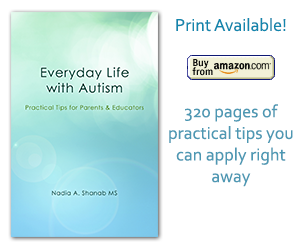Forums
By Nadia Shanab | autism, general advice, parentingA few weeks ago, some readers were asking about some useful forums that discuss problems related to autism and children and adults with autism. I found these two forums very useful. Go check them out. Share your thoughts, find answers to your questions, help other poeple solve their problems. As I mentioned in one article,
A Tip for Easier Transitions
By Nadia Shanab | autism, general advice, parentingRigidity and intolerance is one of the autism most common traits. Sometimes it is hard for children with autism to switch from one activity to another. Children with autism usually have OCD’s (Obssessive Compulsive Disorders) that are very hard to fight or eleminate. So, while they are so focused and “obsessed” with a task at
Modify Undesired Behavior
By Nadia Shanab | autism, general advice, parentingThe tip in this article helps modify the undesired behavior by modifying the child’s emotional state. All you need is a mirror. I rely here on the child’s visual skills. I tried out this technique and it worked out pretty well with a student with autism. Inspired by “The Two-Factor Theory of Emotions” that I
A Simple Tool for Discipline
By Nadia Shanab | autism, general advice, parenting, tipsI simply call this tool “the cards system”. It is a disciplinary tool that can be made at home and it doesn’t cost a penny. I spend maximum 10 minutes to make it. For consistency reasons, it would be great if both, parents and school used the same tool. Parents, who implemented the idea and applied it
Symptoms or Signs of Autism, Simplified
By Nadia Shanab | autism, general advice, parentingIn the previous article “Symptoms or Signs of Autism“, I provided some checklists and descriptions for parents who suspect that their children might have ADS (Autism Spectrum Disorder). In this article I’ll try to re-introduce the subject in a simpler way. *Autism cannot be diagnosed or identified medically. *The screening tools are based on the
Symptoms or Signs of Autism
By Nadia Shanab | autism, general advice, parentingInitially, the blog’s main mission was to provide tips to help parents and educators handle some autism-related problems. But some readers are asking for more information about symptoms or signs of autism, so I decided to incorporate this subject in my blog. I am leaning toward using the word “signs” rather than “symptoms”, since autism
The Siblings of An Autistic Child
By Nadia Shanab | autism, general advice, parentingI am going to talk about a very common mistake many parents of children with autism get caught/trapped into. If the siblings of a child with autism happen to be typically developed (neuro-typical), they usually grow up in an atmosphere different than their peers with typically developed siblings. Having a member of the family with autism,
Teach Independence
By Nadia Shanab | autism, general advice, parentingThe ultimate goal, both, parents and educators are working for, is to render children with autism as independent as possible. We look far ahead, and picture them as adults, living independently, without the need of having us around. The best thing to do is to start the process as early as possible. Early intervention assures


